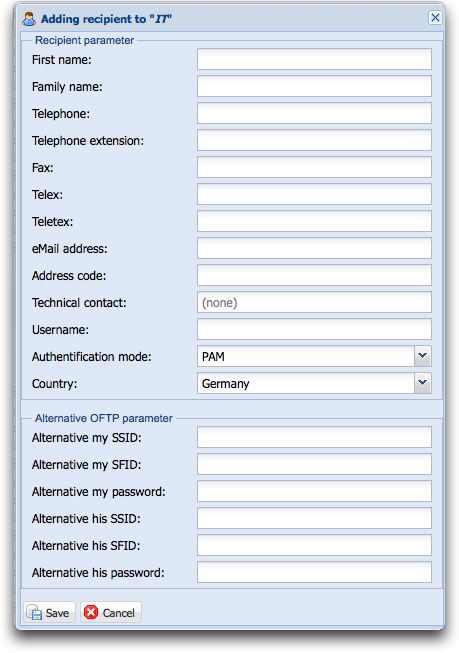Difference between revisions of "Creating person"
From Seon
| (One intermediate revision by the same user not shown) | |||
| Line 2: | Line 2: | ||
---- | ---- | ||
| − | In order to add a new recipient, click on the " | + | In order to add a new recipient, click on the "Add" button when having selected the corresponding department or "parallel" user: |
| − | [[Image: | + | [[Image:add.png]] |
| Line 12: | Line 12: | ||
*address code (mostly 5 or 13 characters long, beginning with an alphabetical character) | *address code (mostly 5 or 13 characters long, beginning with an alphabetical character) | ||
*technical contact (if any other user is contained in this company) | *technical contact (if any other user is contained in this company) | ||
| − | *for internal users: a username with a given authentification mode (internal with password or PAM) | + | *for internal users: a username with a given authentification mode ([[Seon Enterprise user authentification|internal with password or PAM]]) |
Most of these entries are used by the ENGDAT [[Seon plugin seonplugin engdatv2 encode|encoding]] and [[Seon plugin seonplugin engdatv2 decode|decoding]] plugins. | Most of these entries are used by the ENGDAT [[Seon plugin seonplugin engdatv2 encode|encoding]] and [[Seon plugin seonplugin engdatv2 decode|decoding]] plugins. | ||
Latest revision as of 13:13, 1 May 2012
Refering article: Seon Enterprise partner management
In order to add a new recipient, click on the "Add" button when having selected the corresponding department or "parallel" user:
![]()
This leads you to the "insert recipient" form. The following entries should be filled for a good EDI user:
- name
- surname
- eMail address
- address code (mostly 5 or 13 characters long, beginning with an alphabetical character)
- technical contact (if any other user is contained in this company)
- for internal users: a username with a given authentification mode (internal with password or PAM)
Most of these entries are used by the ENGDAT encoding and decoding plugins.
The "alternative OFTP parameters" are (as declared) optional.
The pulldown menus of "plugin package for send processes" and "plugin package for receive processes" are used to define which plugin packages are run for this partner if a recipient-based configuration is wanted.
